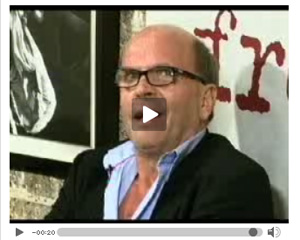While the Press Complaints Commission has had limited contact with social networks directly, it’s an area the industry self-regulatory body wants to look at in further depth, the new director of the PCC Stephen Abell has said.
The PCC is soon to join Twitter, and will be taking part in an event about the media’s use of social networks organised by the think-tank Polis (more details when announced) Abell told Journalism.co.uk, in his first media interview since taking over the role from Tim Toulmin.
[Update: it has joined and made its first tweet: from @UKPCC)
“Newspapers use it [social networking] a lot and it’s a legitimate resource, but it’s certainly not a free for all.”
It’s for the PCC to offer guidance and explore the area, he said. But where does the PCC fit into this exactly? Is the self-regulatory body there to explain the dangers of social networks to the general public? “I think the PCC’s role is for people to understand their right in regards to what the media might do,” he said.
How far should newspapers go with their use of social networks? As Abell was keen to point out, the PCC recently upheld a complaint against the Sunday Times for one of its journalist’s “intrusive” use of Facebook. Users can control what is private and public with different settings, he says, but added that maybe people don’t know enough about “marshalling” their accounts.
But how about if a journalist ‘befriended’ a subject to gain access to private information, and a complaint was later made by that user? It would “raise an issue about a journalist of how honest they have been,” he said. “I think that would depend on the individual case.”
“There’s a function for us there – certainly to train journalists,” he said. “We go into a newspaper and say these are the last decisions we made [on social networking].”
Abell claimed that the presence of 10 lay members on the commission – “with a broad range of experience” – helped the Commission keep up to date with social media trends: “they can reflect changes in cultural expectations”.
With the PCC’s move into this area, it will be interesting to see whether newspapers will face sanctions for the way they use social network information: could they be penalised for presenting information out of context?
A blogger in Ireland, for example, has been in contact with the Irish Ombudsman over an article in the Irish Mail on Sunday which lifted material from her blog. The Mail has defended its actions in a lengthy statement, but bloggers and commenters remain angry about the way the blogger was portrayed in the article. How would the PCC act in a situation like this? Abell agrees that context is a key issue, and complaints over social network use could be made on the grounds of both privacy and accuracy.
 “Indeed the internet is itself a very self-regulatory body”
“Indeed the internet is itself a very self-regulatory body”
Although the PCC seems to be increasingly engaging with online content, comments by its chair, Baroness Buscombe, to the Independent newspaper, taken to mean that bloggers might come under within the PCC’s remit, did not go down well with many high profile bloggers.
“Frankly, we do not feel that the further development of blogging as an interactive medium that facilitates the free exchange of ideas and opinions will benefit from regulation by a body representing an industry with, in the main, substantially lower ethical standards and practices than those already practiced by the vast majority of established British bloggers,” wrote Liberal Conspiracy and Guardian.co.uk blogger Sunny Hundel at the time.
On this subject, Abell claims that Buscombe’s comments were misinterpreted (as she did herself): “I think the point Peta was really making with bloggers, is that she was talking in the context of a speech she was making, talking of the dangers, or the impracticability of top-down regulation – in a world where everyone is a publisher.
“There’s an argument that any form of the internet is going to be about self-regulation – people voluntarily adhering to a set of standards. That might not be anything to do with the PCC at all, but self-regulation fits the internet very well.
“And indeed the internet is itself a very self-regulatory body and blogs tend to work by someone making a proposition and someone challenging it via comments: that can correct any misapprehensions in the beginning and create a dialogue.
“The way it works with newspapers is a useful model I think. Newspapers are voluntarily buying into the PCC (…) a set of standards they are voluntarily adhering to.”
It seems that the point that Abell is making is that both bloggers and newspapers self-regulate, and don’t need statutory control; bloggers could have their own code, even. But bloggers under the PCC? He won’t even go there:
“I think the point about blogging and regulation … it’s far too early … I’m not even saying it [independent blogging] should be connected to the PCC.”
